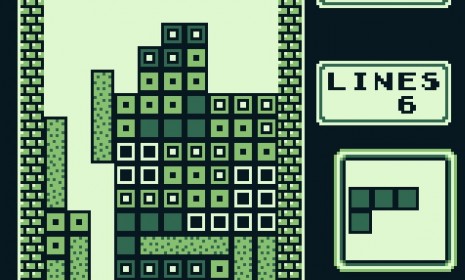A new cure for trauma: Tetris?
The beloved 1984 videogame can help curb traumatic flashbacks, according to a new study. What's its secret?

A free daily email with the biggest news stories of the day – and the best features from TheWeek.com
You are now subscribed
Your newsletter sign-up was successful
The old-school videogame Tetris — all about neatly stacking odd-shaped blocks — can be a "cognitive vaccine" that reduces flashbacks of traumatic memories, researchers at Oxford University have concluded, while other videogames can make bad memories worse. Here's a quick guide to the scientists' findings:
How did researchers reach this conclusion?
Scientists at Oxford University had 60 subjects watch "unpleasant" footage of traumatic injuries, fatal road accidents, and scenes of human surgery, reports NewScientist. Some subjects were asked to play videogames immediately afterwards. For half an hour, 20 of them played Tetris, 20 played a trivia game called Pub Quiz, and the remaining 20 did nothing. Those who played Tetris experienced significantly fewer flashbacks to the grisly footage than either of the other groups, while those who played Pub Quiz had more flashbacks than those who did not play games.
The Week
Escape your echo chamber. Get the facts behind the news, plus analysis from multiple perspectives.

Sign up for The Week's Free Newsletters
From our morning news briefing to a weekly Good News Newsletter, get the best of The Week delivered directly to your inbox.
From our morning news briefing to a weekly Good News Newsletter, get the best of The Week delivered directly to your inbox.
Why would that be?
The researchers say that Tetris exercises the sensory part of the brain, which is also the source of traumatic flashbacks. When a subject is engaged by the task of stacking Tetris' blocks, there's less room for traumatic memories to recur. Pub Quiz, on the other hand, stimulates another, conceptual part of the brain — leaving the sensory channel open and vulnerable to flashbacks.
Could Tetris really help cure PTSD?
Playing games can stave off traumatic memories for up to four hours, say researchers. Theoretically, doctors could prescribe videogames like Tetris for soldiers and accident victims. That makes a lot of sense, says Ed Yong at Discover Magazine. "Tetris is well-known for its ability to get inside the heads of those who play it," leaving gamers preoccupied with solving its puzzles long after they've left the computer behind. That's why the term "Tetris effect" has been applied to any activity that can overshadow participants' thoughts.
A free daily email with the biggest news stories of the day – and the best features from TheWeek.com
Sources: Los Angeles Times, New Scientist, Discover Magazine, Fox News